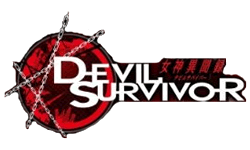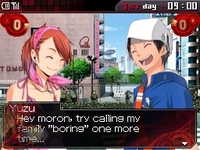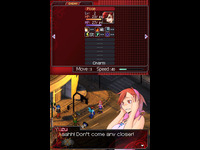|
|

|
PLATFORM
|
DS
|
BATTLE SYSTEM
|

|
INTERACTION
|

|
ORIGINALITY
|

|
STORY
|

|
MUSIC & SOUND
|

|
VISUALS
|

|
CHALLENGE
|
Moderate
|
COMPLETION TIME
|
20-40 Hours
|
|
OVERALL

|
+ Unique hybrid combat system.
+ Great story with multiple endings.
+ Undeniable feeling of tension throughout the game.
+ Great soundtrack from a new composer.
- Some battles seem needlessly cheap.
|
Click here for scoring definitions
|
|
|
Welcome to Raccoon — I mean, Tokyo City. A day like any other, until a massive zombie — excuse me, demon outbreak sparks the Umbrella Corporation — wait, that's not the right — the Special Defense Force to lock down the city, not letting anyone in or out until the situation is under control. This is Shin Megami Tensei: Devil Survivor, a strange hybrid RPG that blends elements of classic Megami Tensei titles, tactical RPGs, and even the ever-popular survival horror genre.
Like most Megami Tensei games, Devil Survivor stars a bunch of teenagers trying to survive in Tokyo as things progressively get worse and worse. Just before the city is locked down, the trio of main characters, led by a nameless hero, are given special, DS-lookalike devices called COMPs. They soon learn that these devices have some peculiar properties: not only can they be used to summon demons, but they also allow their users to see how many days anyone they meet has left to live, and it seems that nobody in all of Tokyo has more than seven days. They also start receiving strange e-mails that predict events before they happen.
Devil Survivor's plot twists and turns as the characters learn more about the situation they've landed themselves in; a mysterious program able to summon demons, a war between demons, and even the involvement of God himself. With a cast of well over a dozen characters, each with a role to play and a story to tell, this is one of the few tactical RPGs where story actually takes a greater focus than combat. In fact, at least half the time spent playing will be going through dialogue scenes, as players need to choose where to go and who to visit in each half-hour period. One choice may lead to the disappearance of another, and poor decisions can have disasterous consequences.
One thing the game does very well is invoking a sense of tension. With only a certain length of time to deal with anything that has to be done, and the knowledge of a dangerous foe looming later in the day, the tension is so thick you can cut it with a knife. When a half dozen different hotspots show up on the map only two hours before a major event, the knowledge that you can't get to all of them piles up the pressure.
Devil Survivor's combat is one of its more interesting elements. It's a hybrid of a tactical RPG and a turn-based RPG that focuses more on preparing and selecting the right spells, skills, and demons rather than on tactical positioning. The battles tend to be very speedy, rarely taking more than fifteen minutes to complete, and the experience and monetary gain is rapid, making grinding quite painless.
 Tension-breaking moments like this only make it worse in the long run.
Tension-breaking moments like this only make it worse in the long run.
|
|
Four human characters can be brought into battle at a time, each leading a pair of demons. As with most Megaten games, demons are acquired by fusing two weaker ones together, but they can also be purchased from the demon auction. Fused demons can be made to inherit player-specified skills, allowing you to customize them as you see fit. The human characters, on the other hand, can learn new skills by cracking them from demons they defeat. Whenever a new skill is learned, it becomes available to all characters, but only one can equip it at a time. This makes selecting which skills to give to which characters one of the most important strategic decisions in the game.
In previous series' games, there haven't been many restrictions on which skills can be given to any character, but Devil Survivor imposes quite a few. For starters, every cracked skill in the game has a stat requirement that goes along with it. If a character doesn't meet those requirements, they can't use that skill. In addition, each character can learn exactly three activated skills, three passive skills, and one automatic or racial skill. There are no exceptions to this rule. You cannot, for example, swap one of your passive skills for a fourth activated skill, or any other possible substitutions. Sorry, but no four-element demons or void-all characters in this Megaten game.
When a battle begins, each character gets a turn to move on the grid and attack an enemy. When attacking or being attacked, the game shifts away from this tactical field and brings up a sub-battle, in which the player selects attacks for the team in a traditional RPG manner. By default, each character or demon on the player and enemy team get one turn before combat ends, but by exploiting enemy weaknesses (which are displayed on the top screen), each party member can gain an extra turn. However, exploiting weaknesses can just as easily cancel an extra turn, and of course it works both ways; enemies can exploit your weaknesses for extra turns as well. The attacking team also has a higher chance of gaining extra turns than the defending one.
This constant shift between tactical and turn-based combat often makes each battle feel more like a dungeon crawl than a tactical RPG, which may be a good or a bad thing depending on how you look at it. Regardless, the system has a definite appeal to those who would otherwise shy away from tactical games. The only time the game tends to acquire a real tactical edge is when alternate winning and losing conditions are put into effect, which can oftentimes be more frustrating than fun.
Fairly regularly throughout the game, the player is tasked with defending one or several NPC characters. In these situations, finding ways to get to and protect them is paramount, and these are the battles that tend to be the hardest to complete. Most of the battles tend to be fairly lenient, allowing for a bit of tactical leeway and providing a nice challenge. Unfortunately, some can be overwhelmingly brutal, with the odds stacked so far against you that you may be tempted to just give up. Battles like this become more common as the game progresses. At the end of the day, the battles you lose most often are lost due to people other than your party dying, which can be incredibly irritating.
 It's just a pixie, you fraidy-cat.
It's just a pixie, you fraidy-cat.
|
|
Despite this issue, the game remains a blast to play. The impressive number of demons available encourages playing free battles for money and experience, and the gain is so quick that towards the end of the game, you might find yourself in a Persona 3 situation: just one more battle, just one more battle. The drive to access that demon that's just outside your reach is a powerful motivator.
Devil Survivor isn't the prettiest game to show up on the DS, but it's not ugly either. The art style is terrific and appropriate for the game's modern, urban setting. The character portraits and demon artwork are all of high quality, but the sprites and environments are only slightly better than what one would find on the GameBoy Advance.
The music is another story. Series staple composer Shoji Meguro was replaced for this endeavor by Takami Asano, vocalist and guitarist for the popular Japanese band Godiego. His compositions are filled with edgy rock anthems usually featuring a lot of electric guitar that provide a nice change of pace from Meguro's techno and J-Pop oriented style. This reviewer certainly hopes to hear more from him in future Megaten games. Unfortunately, the soundtrack is also depressingly short, featuring only twenty-one tracks. Regardless of how good they may be, it isn't a lot to fill out a game of its length. There's also no voicework, but the dialogue and characters have more than enough personality to get by without it.
Devil Survivor is an interesting, original title that caught me completely by surprise. Normally I'm fairly wary of tactical RPGs, but the game's unique blend of tactical and turn-based gameplay coupled with its swift, edge-of-your-seat pacing and rapid combat kept me thoroughly engaged throughout the thirty-some hours it took to complete. I'd be hard-pressed to say that it isn't the best RPG I've played to date on Nintendo's handheld. Devil Survivor is definitely not a game you want to miss.
Review Archives
|









